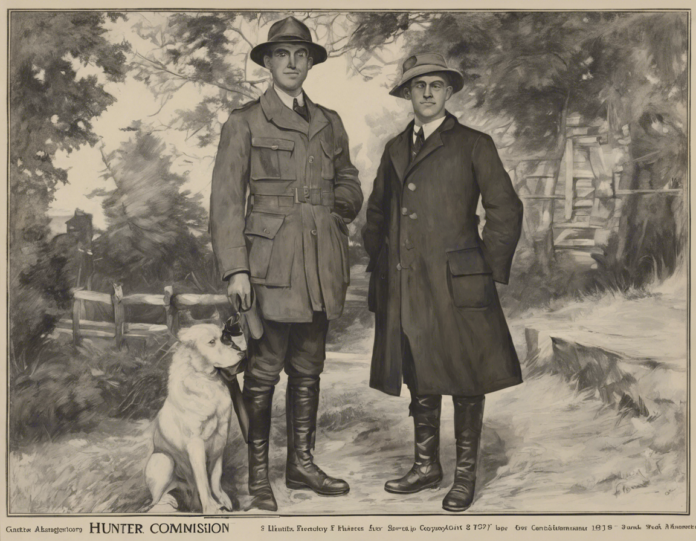The Hunter Commission of 1919, established in the aftermath of the brutal Jallianwala Bagh massacre, was a pivotal moment in the history of British colonial rule in India. Led by the respected British judge Sir William Hunter, the commission was tasked with investigating the massacre, which saw hundreds of unarmed Indian civilians killed by British troops in Amritsar. However, the impact of the Hunter Commission went far beyond this specific event, shedding light on the oppressive nature of British rule in India and paving the way for greater scrutiny and resistance against colonialism.
The Context: British Colonial Rule in India
Before delving into the impact of the Hunter Commission, it is essential to understand the broader context of British colonial rule in India. The British East India Company began its rule in India in the early 17th century, gradually expanding its control over the subcontinent through a combination of military conquest and political alliances with indigenous rulers. By the mid-19th century, following the Indian Rebellion of 1857, direct British Crown rule was established, marking the beginning of the formal British Raj.
The Jallianwala Bagh Massacre: A Turning Point
The Jallianwala Bagh massacre on April 13, 1919, was a watershed moment in the history of British colonial rule in India. Acting under the orders of Brigadier General Reginald Dyer, British troops opened fire on a peaceful gathering of men, women, and children in the enclosed Jallianwala Bagh garden in Amritsar, Punjab. The indiscriminate shooting continued for about ten minutes, resulting in hundreds of deaths and injuries.
Establishment of the Hunter Commission
In the wake of the massacre, the British government faced international condemnation and mounting pressure to investigate the atrocity. As a result, the Hunter Commission was appointed, with Sir William Hunter at its helm. The commission’s primary objective was to examine the circumstances leading to the massacre and the actions of those involved, particularly Brigadier General Dyer.
Key Findings and Repercussions
The Hunter Commission’s findings, released in 1920, were damning. The commission held Brigadier General Dyer responsible for the massacre, criticizing his disproportionate and indiscriminate use of force against unarmed civilians. The report also highlighted broader issues of governance and the oppressive nature of British colonial rule in India. The repercussions of the commission’s findings were profound and far-reaching:
1. International Outrage: The Hunter Commission’s findings intensified international outrage against British colonial rule in India. The massacre and the subsequent investigation were widely covered in the international press, drawing attention to the brutalities perpetrated by the British regime.
2. Indian Nationalism: The Hunter Commission fueled the flames of Indian nationalism and anti-colonial sentiment. The massacre, coupled with the commission’s findings, galvanized Indians to unite against British oppression and demand self-governance.
3. Calls for Independence: The revelations of the Hunter Commission strengthened the demands for Indian independence. Leaders like Mahatma Gandhi and Jawaharlal Nehru invoked the massacre as a symbol of British tyranny and a rallying cry for freedom.
4. End of British Raj: The fallout from the Jallianwala Bagh massacre and the Hunter Commission’s findings hastened the decline of the British Raj. The event marked a turning point in India’s struggle for independence and ultimately contributed to the dismantling of British colonial rule in 1947.
Legacy of the Hunter Commission
The legacy of the Hunter Commission extends beyond its immediate impact on British colonial rule in India. The commission’s findings and the public outcry that followed paved the way for significant changes in governance and paved the way for future movements for independence and social reform. The Hunter Commission remains a stark reminder of the injustices perpetuated under colonial rule and the power of truth and accountability in shaping history.
FAQs
1. What was the significance of the Jallianwala Bagh massacre?
The Jallianwala Bagh massacre was a turning point in India’s struggle for independence, highlighting the brutality of British colonial rule and galvanizing the Indian nationalist movement.
2. Who was Brigadier General Dyer, and what role did he play in the massacre?
Brigadier General Reginald Dyer was the military officer in charge of the troops that fired on the peaceful gathering in Jallianwala Bagh. His actions were widely condemned for their indiscriminate use of force.
3. How did the Hunter Commission impact the course of Indian history?
The Hunter Commission’s findings fueled anti-colonial sentiment, strengthened the demand for Indian independence, and contributed to the eventual end of British colonial rule in India.
4. What were some of the key repercussions of the Hunter Commission’s findings?
The Hunter Commission’s findings intensified international outrage, fueled Indian nationalism, and hastened the decline of the British Raj.
5. How did the legacy of the Hunter Commission influence future movements and inquiries in India?
The Hunter Commission set a precedent for truth and accountability in governance, inspiring future movements for independence, social justice, and human rights in India.
In conclusion, the Hunter Commission of 1919 stands as a critical moment in the history of British colonial rule in India. Its investigation into the Jallianwala Bagh massacre exposed the oppressive nature of colonialism and fueled the flames of Indian nationalism and resistance. The commission’s legacy continues to resonate in India’s ongoing journey towards social justice, accountability, and independence.
